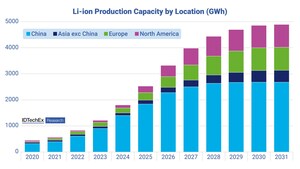
BOSTON, Nov. 4, 2022 /PRNewswire/ -- The advent of DNA sequencing has revolutionized our understanding of biology, bringing an unparalleled level of insight into genetics. DNA sequencing also offers the potential for highly personalized healthcare: by incorporating a patient's genomic information into their health records, treatments may potentially be tailored towards individual patients. The IDTechEx report, "DNA Sequencing 2023-2033: Technologies, Markets, and Forecasts" explores the technologies and markets of the US$8.2 billion DNA sequencing industry.
A major driver for the DNA sequencing industry has been the rapidly falling costs. As a noteworthy example, market leader Illumina managed to lower the cost of a human whole genome sequence from an estimated US$1M in 2007 to US$1k in 2014. Despite this drastic reduction in costs, the use of DNA sequencing in healthcare remains limited – however, sequencing shows clear potential in several use cases for diagnostics.
Sequencing can be used to supplement applications where genetic tests, such as PCR, are inefficient. A clear example is demonstrated in companion diagnostics (CDx) for cancer treatment, which is one of the main applications of DNA sequencing in healthcare today. By recognizing the presence and absence of specific genes, CDx can identify patients that are likely to receive particularly beneficial or detrimental effects from these targeted therapies. While these can be done with genetic tests such as PCR, the limited information available from these methods can slow down and increase the complexity of the process. A single test to detect a single mutation is inefficient; there is a need for more advanced tests capable of detecting multiple genetic mutations, as is possible with DNA sequencing.
DNA sequencing can be used to help in cancer treatment, but we may go a step further and ask: could DNA sequencing be used to avoid late-stage cancer altogether? This was the goal of GRAIL, a startup that spun out of sequencing giant Illumina in 2016 to provide liquid biopsy tests. These tests sequence cell-free nucleic acids in the blood to identify potential signs of cancer to allow for early detection and treatment of the disease. The company's aspirations attracted investors such as Bill Gates and Bezos Expeditions, raising around US$ 2 billion in funding. Growing interest in population genomics may further supplement this goal; by identifying genetic predispositions towards cancer (among many other genetic diseases) through DNA sequencing, risk models can be created, and pre-emptive screening better targeted to enhance support and treatment. This may potentially save healthcare providers a significant amount of money by moving towards a preventative healthcare model and reducing the need for treating severe complications from genetic disease. Once again, sequencing offers a clear value proposition in these applications through the comprehensive amount of information it provides.
The concept of early diagnosis for genetic disease can extend even further. A potentially major application for DNA sequencing is noninvasive prenatal testing (NIPT), which analyses DNA fragments in a pregnant woman's blood to determine the risk that a fetus will be born with certain genetic abnormalities. NIPT can be helpful for notifying pediatrics and informing parents, who may need to prepare for raising a child afflicted with such genetic conditions. There is undoubtedly a demand for NIPT, although ethical concerns and legal restrictions may restrict this market.
The eventual goal of DNA sequencing is the integration of a patient's genetic sequence with their health records, allowing treatments to be personalized towards individuals. This is an ambitious and highly complex process, impeded by high costs and limited understanding. However, the rapid progress the industry has made over the years may mean this future is less uncertain than it seems. It is possible that DNA sequencing may one day prove to indeed be the sensible choice for clinical diagnostics, leading to a new age of healthcare. For more information on this rapidly evolving industry, please refer to the IDTechEx report, "DNA Sequencing 2023-2033: Technologies, Markets, and Forecasts". Sample pages can be downloaded from the right-hand side of this page – www.IDTechEx.com/DNA.
To find out more about the IDTechEx healthcare portfolio, please visit www.IDTechEx.com/Research/Healthcare.
About IDTechEx
IDTechEx guides your strategic business decisions through its Research, Subscription and Consultancy products, helping you profit from emerging technologies. For more information, contact [email protected] or visit www.IDTechEx.com.
Media Contact:
Lucy Rogers
Sales and Marketing Administrator
[email protected]
+44(0)1223 812300
Social Media Links:
Twitter: www.twitter.com/IDTechEx
LinkedIn: www.linkedin.com/company/IDTechEx
Facebook: www.facebook.com/IDTechExResearch
Logo: https://mma.prnewswire.com/media/478371/IDTechEx_Logo.jpg
SOURCE IDTechEx








Share this article